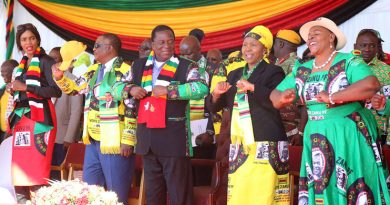Zimbabwe Pays Tribute To Dr Joshua Nkomo As Opposition Dismisses Government’s Commemoration As “Insincere”
1 July remains etched in the hearts of millions of Zimbabweans, 26 years after the passing of “Father Zimbabwe” and former Vice President Dr Joshua Nkomo. His legacy transcends political divides as the nation unites to honour a man who fought for liberation, only to discover that even freedom did not free his people from the chains of colonialism.
Nkomo’s popularity soared both before and after independence. In the darkest days of the 1980s, he fled the country when then Prime Minister Robert Mugabe deployed North Korean-trained troops known as the Fifth Brigade into parts of Midlands and Matabeleland provinces, killing about 20 000 Ndebele-speaking people and ZAPU supporters.
Under the pretext of quelling “renegades”, these forces committed gross atrocities against those seen as aligned with Nkomo. Nkomo’s statue, erected in Bulawayo, a bronze likeness by North Korea’s Mansudae Art Studio, stands at the intersection of Joshua Nkomo Street and 8th Avenue, a testament to his enduring influence.
In a statement on Tuesday, President Emmerson Mnangagwa, who oversaw those very operations as state security minister then, described Dr Nkomo as “a liberator and champion of Pan-Africanism.”
Mnangagwa praised Nkomo affectionately known as “Chibwe Chitedza” for enduring imprisonment in places like Gonakudzingwa and for never compromising his spirit.
“Chibwe Chitedza as Dr Nkomo came to be popularly known, endured imprisonment in notorious camps such as Gonakudzingwa, but the colonial efforts failed to break his spirit. Today, twenty-six years later, Zimbabwe can look back with pride to the life of a liberator, an astute politician, a champion of Pan-Africanism,” he said.
Mnangagwa lauded Nkomo as a beacon of peace and unity, invoking his commitment to reconciliation and national cohesion.
“Umdala wethu and his generation of impeccable revolutionaries always preached peace as the bedrock of nation building. We are using the peace dividend to implement pro-people oriented policies and high impact programmes and projects in our endeavour to deliver decent livelihoods to all citizens in a free democratic Zimbabweans.”
Zanu-PF politburo member Tendai Chirau echoed this sentiment, acknowledging Nkomo’s role in the liberation struggle and describing him as a selfless statesman, whose vision remains a benchmark of leadership today.
“A visionary who began the fight against colonialism in his youth, Cde Nkomo was a true statesman whose leadership left indelible marks on history. Though he is no longer with us, his legacy endures as a timeless template of selfless leadership,” Chirau wrote on his X account on Tuesday.
Yet, not all are convinced of Mnangagwa’s sincerity. Prince Dubeko’s Sibanda, former MP for Binga North, dismissed the commemoration as hollow.
“Your commemoration isn’t sincere. You hated him to the bone,” he wrote on X.
Other critics described the tribute as crocodile tears, accusing Mnangagwa of hypocrisy in light of past violence against Nkomo’s supporters.
One X handle by Mr Matebele wrote: “Emmerson and Robert Mugabe tormented this man, funny how today you are remembering him after killing his commanders and people of Matebeleland…what a disgrace.”
Opposition voices, including Gift Ostalos Siziba, former MP for Tshabalala, lauded Nkomo as “a revolutionary icon with extraordinary character and unwavering discipline” and recalled his enduring words: “Zimbabwe will not die, its young people will save it.” These, he said, continue to inspire future leaders.
Dr Joshua Nkomo was born on 19 June 1917 in Matopo, a coalition builder who co-founded the National Democratic Party in 1960 and later ZAPU.
After being jailed by the Rhodesian government in 1964, he returned to lead resistance efforts.
Nkomo’s life remains a symbol of unity and resilience. Zanu PF, in its last annual conference in Bulawayo last year, passed a resolution to pronounce July 1, each year, a public holiday, but it has not been sanctioned by Mnangagwa himself.
Dr Nkomo died on 1 July 1999 at Parirenyatwa Hospital in Harare and was interred at the National Heroes Acre in Harare. He was 82. *NewZW*




